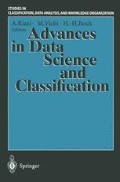Abstract
This paper introduces two forms of informational complexity ICOMP criteria of Bozdogan (1988, 1990,1994) as a decision rule for model selection and evaluation in Bayesian Confirmatory Factor Analysis (BAYCFA) model due to Press and Shigemasu (1989) in contemporaneously choosing the number of factors and determining the “best” approximating factor pattern structure. A Monte Carlo simulation example with a known factor pattern structure and known actual number of factors is shown to demonstrate the utility and versatility of the new approach in recovering the true structure.
Access this chapter
Tax calculation will be finalised at checkout
Purchases are for personal use only
Preview
Unable to display preview. Download preview PDF.
References
Akaike, H. (1973). Information theory and an extension of the maximum likelihood principle, in: Second International Symposium on Information Theory B.N. Petrov and F. Csaki (Eds.) Budapest: Academiai Kiado, 267–281.
Bozdogan, H. (1988). ICOMP: A new model selection criterion, in: Classification and Related Methods of Data Analysis, Hans H. Bock (Ed.), Amsterdam: North -Holland, 599–608.
Bozdogan, H. (1990). On the information-based measure of covariance complexity and its application to the evaluation of multivariate linear models, Communications in Statistics, Theory and Methods, 19 (1), 221–278.
Bozdogan, H. (1994). Mixture-model cluster analysis using a new informational complexity and model selection criteria, in: Multivariate Statistical Modeling, Volume 2, Proceedings of the First US/Japan Conference on the Frontiers of Statistical Modeling H. Bozdogan (Ed.), Dordrecht: Kluwer Academic Publishers, the Netherlands, 69–113.
Hartigan, J. (1975). Clustering algorithms, John Wiley and Sons, New York.
Mulaik, S. A. (1989). Personal correspondence.
Press, S. J. (1982). Applied multivariate analysis: using Bayesian and frequentist methods of inference, Malabar, Florida: Robert E. Krieger Publishing Co., Inc. Press S. J. and Shigemasu, K. (1989). Bayesian inference in factor analysis, in: Contributions to Probability and Statistics: Essays in Honor of Ingram Olkin, L. Gleser, M. Perlman, S.J. Press, and A. Sampson (Eds.), New York: Springer- Verlag, 271–287.
Rissanen, J. (1978). Modeling by shortest data description, Automatica, 14, 465– 471.
Schwarz, G. (1978). Estimating the dimension of a model, Annals of Statistics, 6, 461–464.
Van Emden, M.H. (1971). An analysis of complexity. Amsterdam: Math. Centre Tracts 35.
Author information
Authors and Affiliations
Editor information
Editors and Affiliations
Rights and permissions
Copyright information
© 1998 Springer-Verlag Berlin · Heidelberg
About this paper
Cite this paper
Bozdogan, H., Shigemasu, K. (1998). Bayesian Factor Analysis Model and Choosing the Number of Factors Using a New Informational Complexity Criterion. In: Rizzi, A., Vichi, M., Bock, HH. (eds) Advances in Data Science and Classification. Studies in Classification, Data Analysis, and Knowledge Organization. Springer, Berlin, Heidelberg. https://doi.org/10.1007/978-3-642-72253-0_45
Download citation
DOI: https://doi.org/10.1007/978-3-642-72253-0_45
Publisher Name: Springer, Berlin, Heidelberg
Print ISBN: 978-3-540-64641-9
Online ISBN: 978-3-642-72253-0
eBook Packages: Springer Book Archive

